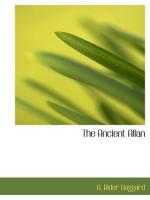“Yes, my people,” cried Bes, “it is I, Karoon, who having been miraculously preserved from many dangers in far lands by the help of the Grasshopper in heaven, and, as my messengers will have told you, of my beloved friend, lord Shabaka the Egyptian, who has deigned to come to dwell with us for a while, have at length returned to Ethiopia that I may shed my wisdom on you like the sun and pour it on your heads like melted honey. Moreover, mindful of our laws which aforetime I defied and therefore left you, I have searched the whole world through till I found the most beautiful woman that it contained, and made her my wife. She too has deigned to come to this far country to be your queen. Advance, fair Karema, and show yourself to these my Ethiopians.”
So Karema stepped forward and stood on the prow of the boat by the side of Bes, and a strange couple they looked. The Ethiopians who had risen, considered her gravely, then one of them said,
“Karoon called her beautiful, but in truth she is almost white and very ugly.”
“At least she is a woman,” said another, “for her shape is female.”
“Yes, and he has married her,” remarked a third, “and even a king may choose his own wife sometimes. For in such matters who can judge another’s taste?”
“Cease,” said Bes in a lordly way. “If you do not think her beautiful to-night, you will to-morrow. And now let us land and rest.”
So we landed and while I did so I took note of these Ethiopians. They were great men, black as charcoal with thick lips, white teeth and flat noses. Their eyes were large and the whites of them somewhat yellow, their hair curled like wool, their beards were short and on their faces they wore a continual smile. Of dress most of them had little, but their elders or leaders wore lion and leopard skins and some were clad in a kind of silken tunic belted about the middle. All were armed for war with long bows, short swords and small shields round in shape and made from the hide of the hippopotamus or of the unicorn. Gold was plentiful amongst them since even the humblest wore bracelets of that metal, while about the necks of the chieftains it was wound in great torques, also sometimes on their ankles. They wore sandals on their feet and some of them had ostrich feathers stuck in their hair, a few also had grasshoppers fashioned of gold bound on the top of their heads, and these I took to be the priests. There were no women in their number.
As the sun was sinking we were led at once to a very beautiful tent made of woven flax and ornamented as I have described, where we found food made ready for us in plenty, milk in bowls and the flesh of sheep and oxen boiled and roasted. Bes, however, was taken to a place apart, which made Karema even more angry than she was before.
Scarcely had we finished eating when a herald rushed into the tent crying, “Prostrate yourselves! Yea, be prostrated, the Grasshopper comes! Karoon comes.”




